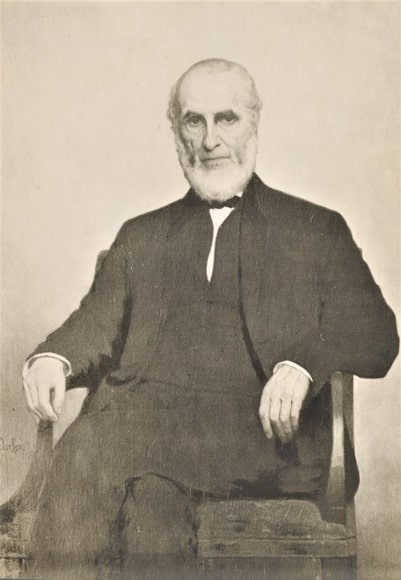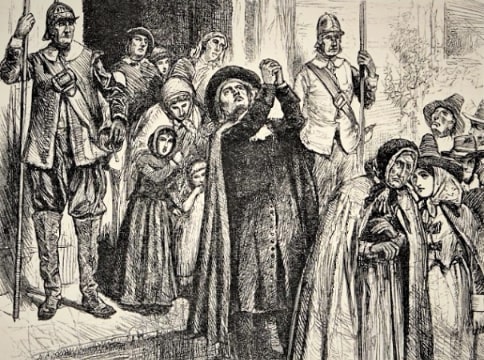Introduction: In this article, Melissa Davenport Berry describes how the Puritans’ persecution of Quakers in Colonial America was stopped by King Charles II. Melissa is a genealogist who has a blog, AnceStory Archives, and a Facebook group, New England Family Genealogy and History.
One brave voice rose above the din.
Upsall, gray with his length of days,
Cried from the door of his Red Lion Inn:
“Men of Boston, give God the praise!
No more shall innocent blood call down,
The bolts of wrath on your guilty town.
The freedom of worship, dear to you,
Is dear to all, and to all is due.”–John Greenleaf Whittier, “The King’s Missive”
In 1880 the city of Boston was preparing to celebrate the 250th anniversary of the town’s settlement. James Ripley Osgood, a Boston publisher, commissioned a ballad from the poet John Greenleaf Whittier for “The Memorial History of Boston, including Suffolk County, Massachusetts, 1630-1880,” a book series to commemorate and chronicle historic episodes.

Whittier chose a subject that many Bostonians wanted to forget: the Quaker persecutions that occurred in 17th century Massachusetts Bay Colony.
The ballad recalls the story of Samuel Shattuck, a practicing Quaker in Salem, Massachusetts, who was sentenced to banishment from the colony on pain of death on 11 May 1659.
Instead of caving in, Shattuck went to England and presented a case before King Charles II to cease the persecution of Quakers.
Shattuck, with the assistance of Edward Burrough, who had the ear of the king, obtained on 19 September 1661 a mandamus commanding the magistrates and ministers of New England to “forbear to proceed any further” against the Quakers. Shattuck carried this mandamus back to Massachusetts in 1661.
The above lines from Whittier’s poem “The King’s Missive” are a reference to the Red Lyon Tavern owner Nicholas Upshall (spelled “Upsall” in the ballad) who was jailed for aiding and abetting Quakers. He was released with the others from the Boston Goal on the orders of King Charles II.
The Worcester Daily Spy gave a detailed background to the historical event. In summary, the Quakers were fed up with the Puritans’ cruel punishments and in their efforts to stop any more executions of their “Friends” they decided to appeal to King Charles II.
The newsclip revealed a portion of the mandamus, or “The King’s Missive,” as follows:
“If there be any of those people called Quakers among you condemned to suffer death or other corporeal punishment, or that are imprisoned and obnoxious to the like condemnation, you are to forbear to proceed any further therein,” but if any Quakers misbehaved themselves, to send them over to him and he would take care of them!
It further noted that:
This advice [of the King] was speedily heeded, and at the ensuing session of the general court, Dec. 9, 1661, an order was passed directing the “release and discharge” of all the Quakers imprisoned, which was done forthwith, and the reverend defender of those cruel persecutors, John Norton, was sent over to the king to apologize for and smooth over, in behalf of the government at Boston, what had been so wickedly done here.
The Quakers were a rebellious bunch and sometimes used shocking tactics to revolt against the injustices imposed upon them. One example is Lydia Wardwell showing up naked to Newbury Church.
Wardwell stripped down to protest the whippings and heavy fines imposed upon her sect.
Whittier, like Henry Wadsworth Longfellow, had ancestors who suffered various punishments during the dark times of religious persecution, and crafted entertaining verses about their plight.
Longfellow used many of the same characters in his New England Tragedies as Whittier used in “The King’s Missive.”
The most-referenced character was Massachusetts Governor John Endicott, who labeled Quakers “vile heretics” and “dangerous intruders invading our borders.”
Nathaniel Hawthorne also wove Quaker themes into his work. His own ancestor William Hathorne was one of the magistrates who persecuted the sect.
His grandfather Captain Daniel Hathorne married Rachel Phelps, the granddaughter of Nicholas Phelps, who was part of the effort to stop the persecutions.
Hawthorne was familiar with the methods of punishment the Puritans used on their subjects. To quell a Quaker, a good branding would often be issued. The letter “H” for “heresie” was burned into the face or hand with a red-hot iron. Sound familiar?
Despite the tenacious efforts of the magistrates (before the king’s intervention), the Quakers persisted and held worship in secret. See: Early Quaker Meetings Raided by Salem Authorities.
Nicholas Phelps and Josiah Southwick of Salem, both banished upon pain of death, traveled with Shattuck.
King Charles II had Quaker sympathies and was a close friend of William Penn, to whom he granted territory which became Pennsylvania.
A list of the cruel punishments and injustices endured by the Quakers in the colonies was presented to the king and Whittier wrote the following stanza:
“There was a Vein of innocent Blood open’d in his Dominions, which if it were not stopt might over-run all.
To which the king replied, ‘But I will stop that Vein.’”
The London Society of Friends hired Ralph Goldsmith to escort Shattuck and “Friends” back to America. Goldsmith is among those whose sufferings for conscience’s sake is listed on the monument at Shelter Island.
In his ballad, Whittier showed a transformation that Shattuck (a symbolic representative of all Quaker Friends) experienced when the message from the “Merry Monarch” was placed before Governor Endicott.
The “knave” Shattuck was now addressed as “Mr. Shattuck” and the proud Endicott removed his hat and bowed to Shattuck and promised “implicit obedience.”
The Quaker prisoners were released from the jail, and they and their “Friends” outside were for the first time permitted to meet in Boston, and praise God for their deliverance.
According to Drake’s History of Boston, an order was issued for the discharge of the Quakers then in prison.
At that time William Salter was the prison-keeper, and records reveal there were 28 convicted Quakers in Boston jail. One of them, Wenlock Christison, was under sentence of death.
The “King’s Missive” did stop the executions, and it was a pivotal point for Quakers. Whittier’s account is in his usual fashion, displaying his witty skill.
Explore over 330 years of newspapers and historical records in GenealogyBank. Discover your family story! Start a 7-Day Free Trial
Note on the header image: Quaker prisoners released from the Boston jail due to the orders of King Charles II. Credit: from an illustrated version of John Greenleaf Whittier’s poem “The King’s Missive” published in “The Memorial History of Boston, including Suffolk County, Massachusetts, 1630-1880,” 1880.
Related Article:
